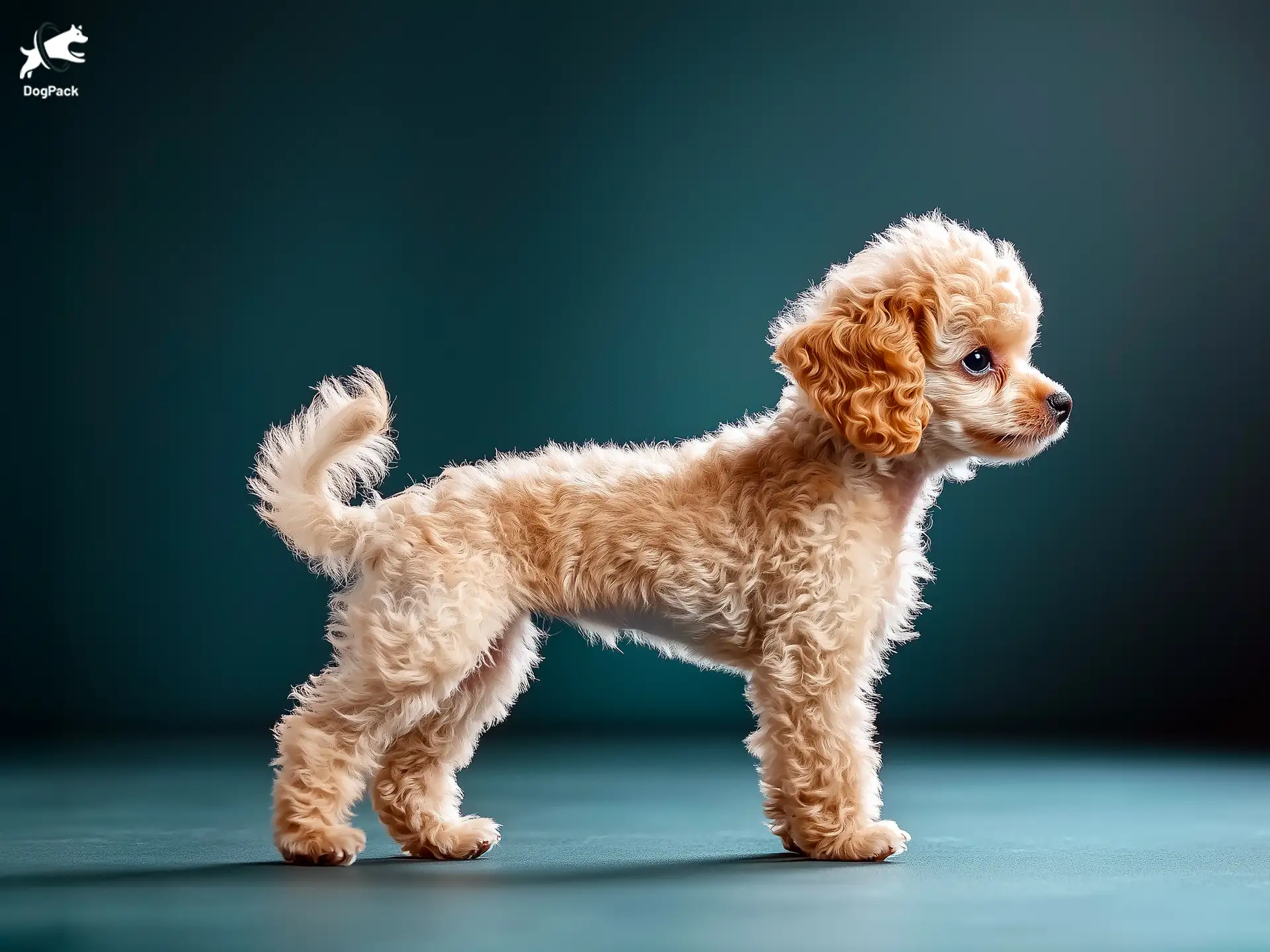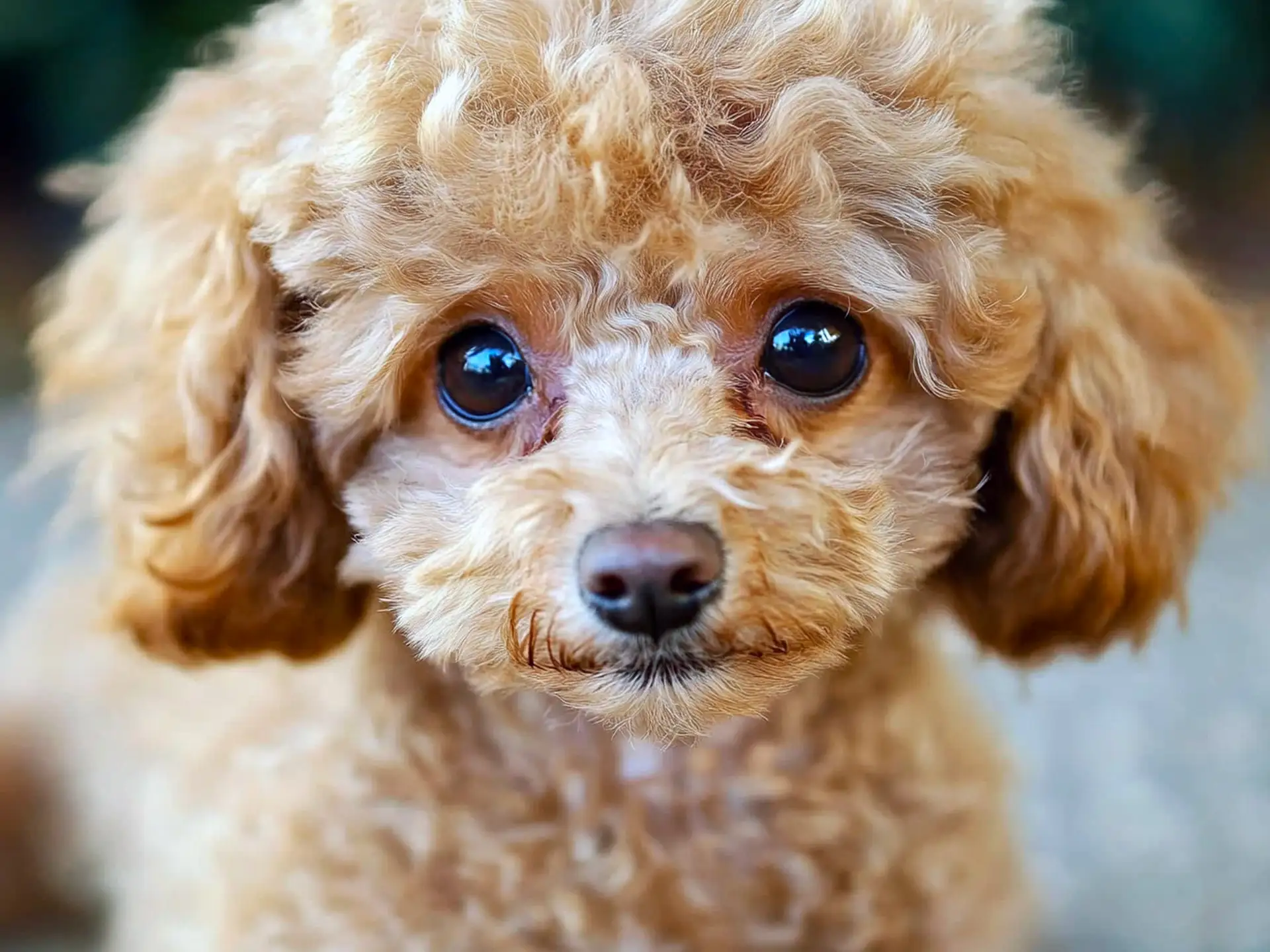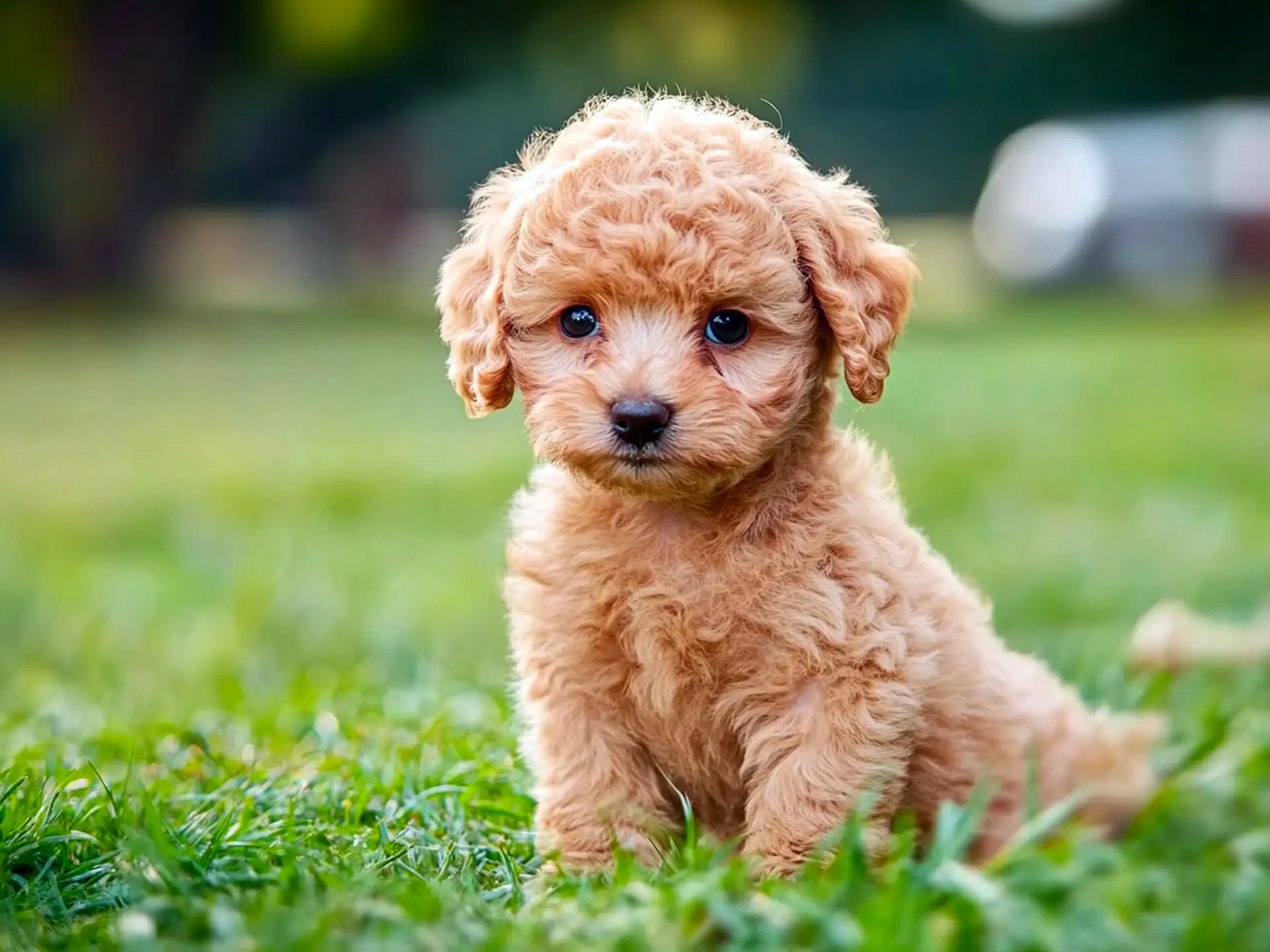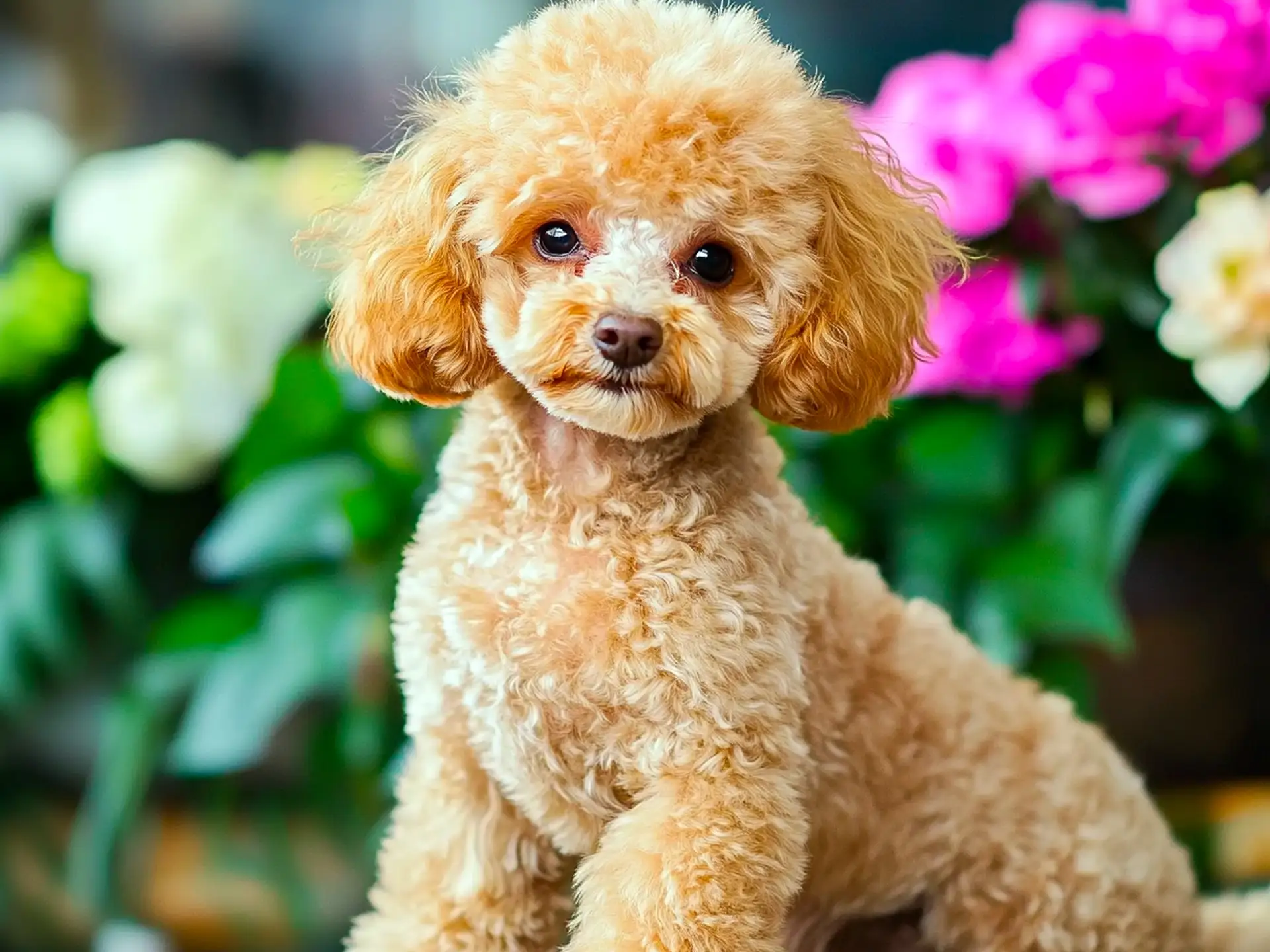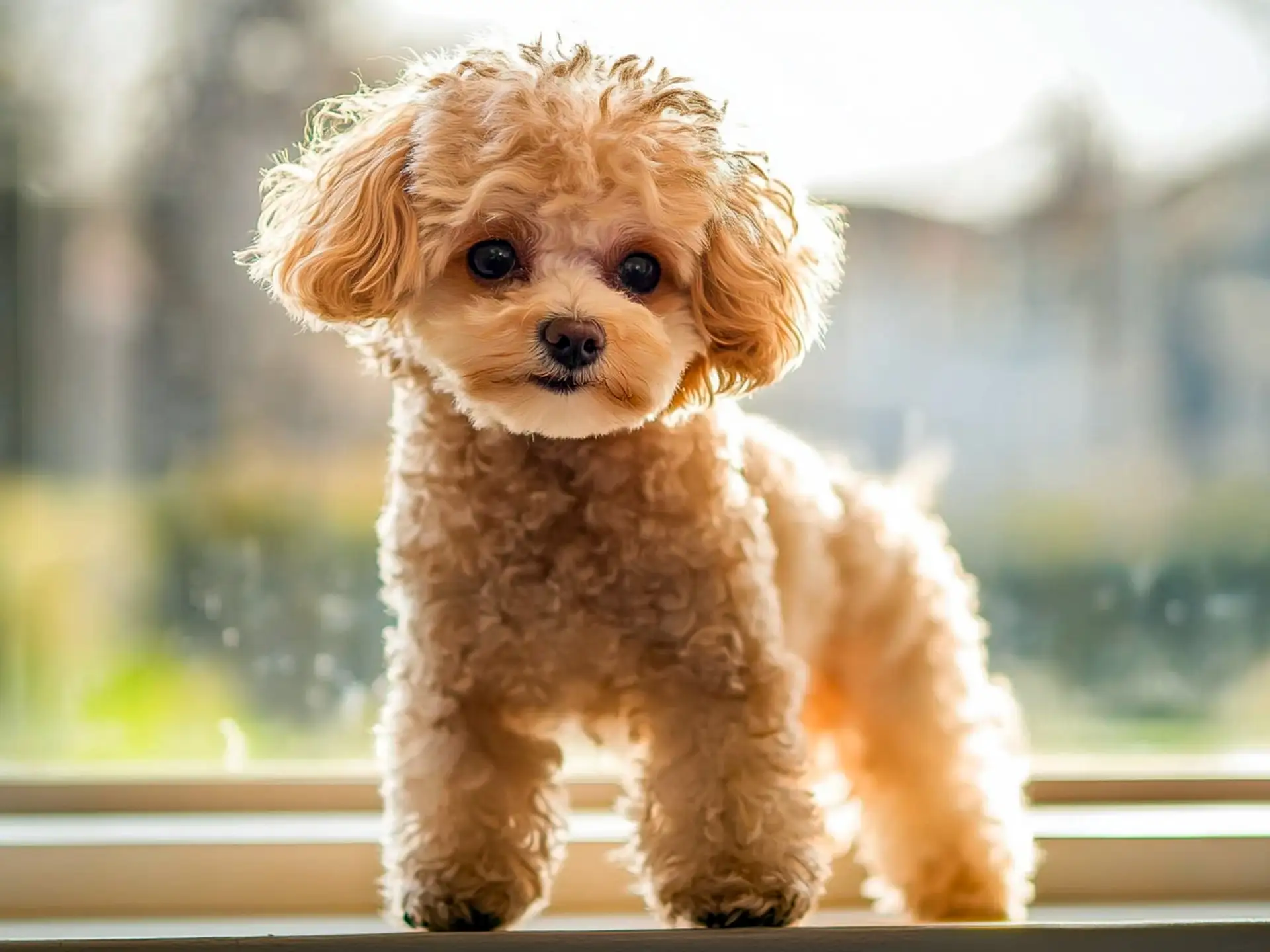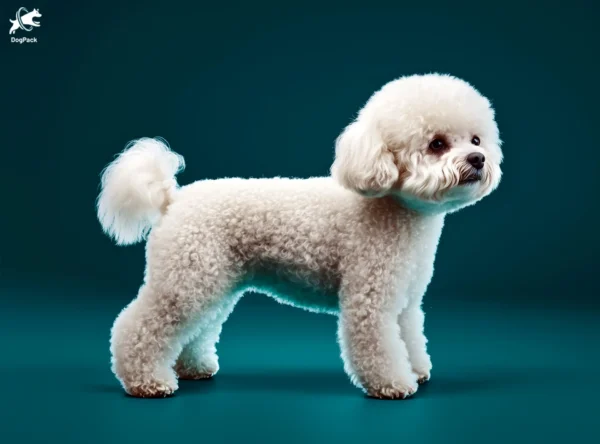Toy Poodle Dog Breed Info & Overview
With their trademark curly coats and compact size, Toy Poodles shine as elegant companions that fit perfectly in small homes. Known for their intelligence and agility, these tiny canines are more robust than they look. Their bright, curious personalities make them endearing, and their hypoallergenic coat seals the deal for allergy-prone owners.
Miniature Poodle vs. Toy Poodle: Key Differences
| Feature | Miniature Poodle | Toy Poodle |
|---|---|---|
| Size | 10–15 inches (25–38 cm) | Under 10 inches (25 cm) |
| Weight | 10–18 lbs (4.5–8 kg) | 4–6 lbs (1.8–2.7 kg) |
| Recognition | AKC, FCI, UKC, CKC | AKC, FCI, UKC, CKC |
Characteristics
Pictures
Breed History
Though poodles famously originated in Germany, they rose to prominence in France, where their elegant style captured hearts across Europe. Over centuries, breeders selectively shrank larger standard poodles, eventually creating the playful, pocket-sized variety cherished by urban dwellers. With their undeniable flair, these miniature canines moved from royal courts to everyday homes, earning a reputation for both beauty and brains.
For centuries, poodles served as versatile hunting companions, skilled at retrieving waterfowl with their keen intelligence. Over time, demands for smaller, more portable pets led to the rise of the Toy Poodle. These dogs became prized in high society circles and circuses alike, where their ability to learn elaborate tricks showcased a winning blend of charm and cleverness.
Today’s smaller poodles owe their existence to breeders determined to maintain the elegant look and quick wits of their larger kin while downsizing the overall frame. Their global popularity soared throughout the 20th century, thanks in part to their hypoallergenic coats. As interest grew, kennel clubs worldwide recognized these diminutive wonders, solidifying their place among the most beloved companion dogs.
Temperament, Personality
Spirited and intelligent, these little dynamos quickly form tight bonds with their families. Their keen awareness of surroundings often makes them vigilant watchdogs, despite their petite build. While they thrive on human interaction, they also appreciate having a cozy spot to curl up and observe household happenings, content to watch the world with their bright, curious eyes.
Toy Poodle enthusiasts often rave about the breed’s affectionate nature and quick learning. They excel at reading human emotions, offering comforting cuddles when you’re down and entertaining antics when you’re up for play. However, because of their intelligence, they can become bored or anxious if not mentally engaged, so varied stimulation is crucial to keep them well-adjusted.
Early socialization helps these dogs adapt to new situations and family members, preventing them from becoming timid around strangers. Their adaptable nature makes them suitable for singles, seniors, or busy households. Still, they crave attention and enjoy being the center of activities. With consistent guidance, they’ll display the perfect balance of independence and devotion to those they love.
Physical Characteristics
Beneath the fancy curls lies a sturdy frame built for agility. Despite their dainty reputation, they’re surprisingly athletic, capable of quick sprints and nimble movements. Poodles of this size typically stand under 10 inches at the shoulder, packing all the grace of larger varieties into a petite silhouette. Their expressive eyes and proud carriage exude confidence wherever they go.
A Toy Poodle features a single-layer, curly coat that rarely sheds, making them highly sought after by those with allergies. Standard coat colors include black, white, silver, and various shades of brown or apricot. That signature fluff can be styled in multiple trims, from the show-stopping Continental Clip to simpler pet cuts that keep grooming more manageable.
Another defining feature is their distinct head shape, characterized by a slightly rounded skull and a long, straight muzzle. Ears hang close to the head, framing a face known for its intelligent expression. Add in small, oval eyes and a taut body frame, and you have a dog whose graceful presence belies its size—capturing hearts in any setting.
Health Issues
Genetics and responsible breeding play major roles in preventing hereditary conditions. Common concerns include patellar luxation, where the kneecap can slip out of place, and progressive retinal atrophy, which may impair vision over time. Regular vet check-ups, along with early screening, help catch these issues before they escalate. Dental care is also essential, as smaller jaws can lead to crowding.
Toy Poodle owners should also watch for issues related to the breed’s small size, such as hypoglycemia. Maintaining a consistent feeding schedule, with several small meals a day for puppies, can prevent sudden drops in blood sugar. Because these pups are agile jumpers, it’s wise to safeguard furniture heights to avoid inadvertent injuries during leaps and bounds.
A balanced diet, moderate exercise, and routine veterinary visits are cornerstones of overall well-being. Preventative measures such as dental cleanings and parasite control can extend a dog’s lifespan and enhance quality of life. Monitoring behavior changes—like excessive thirst or lethargy—allows for early intervention. With proper care, these petite companions can enjoy long, active lives free from major complications.
Grooming Needs
Frequent grooming is part of life with these curly-coated canines. Their hair grows continuously, much like human hair, which means regular trims keep their coats healthy and tangle-free. Brushing at least a few times a week helps prevent matting, which can be uncomfortable for them. Many choose professional grooming to maintain a polished look, though home grooming is feasible.
For a Toy Poodle, coat styles vary from the classic lamb trim to more elaborate show clips. Regardless of the aesthetic, consistent upkeep is crucial. Their skin is sensitive, so bathing with mild shampoos and conditioners helps maintain coat health. Pay special attention to ears, as hair growth in the ear canal can trap moisture and lead to infections.
Nail care is another essential part of grooming, ensuring their paws remain comfortable. Regular trimming or filing prevents nails from splitting or snagging on carpets. Checking for irritations, lumps, or bumps during brushing sessions can alert you to potential health issues early. While grooming may be time-consuming, the rewards of a well-maintained coat and healthy skin are well worth it.
Exercise Requirements
Don’t be fooled by their size: these dogs still appreciate regular activity. Short, brisk walks around the neighborhood or brief play sessions in the yard help them burn energy and stay mentally stimulated. Indoors, they’ll chase toys or happily trot alongside you as you move about. The key is consistency, ensuring they get daily outlets for their lively curiosity.
A Toy Poodle typically benefits from puzzle toys and interactive games that challenge their sharp minds. Agility courses, even homemade obstacle setups, satisfy their nimble bodies and keep boredom at bay. While they don’t need marathon runs, they do thrive on variety. Mixing up walk routes or introducing new toys keeps them motivated and engaged, supporting both physical and mental health.
Because they’re small and somewhat delicate, you’ll want to avoid high-impact or overly strenuous activities. Gentle play and careful monitoring keep them safe. If they show signs of tiredness, like heavy panting or lagging behind, consider it time for a break. By balancing gentle exercise with mental stimulation, these pups remain content and fit without risking strain or injury.
Training Tips
As quick learners, poodles often pick up commands faster than many other breeds. Reward-based methods, using treats or praise, build positive associations and encourage cooperation. Short, focused sessions suit their attention spans, especially while they’re young. Overly repetitive drills can bore them, so varying your training routine ensures they stay interested, making the entire process more enjoyable for everyone.
For a Toy Poodle, socializing early and often is especially vital due to their alert nature. Introducing them to various environments, people, and pets helps curb nervousness or excessive barking. Consistency in rules and boundaries further shapes a confident companion. If they sense inconsistency, these smart pups might test limits, so setting clear expectations benefits both dog and owner.
Using hand signals along with verbal cues taps into their visual acuity, enhancing communication. Keep training sessions fun, mixing obedience commands with tricks like spin or high-five. These dogs thrive on praise, so celebrating small victories motivates them to keep learning. A patient, upbeat approach fosters a strong bond and a well-behaved, eager-to-please pet in the long run.
Nutrition, Diet
Due to their petite size and active minds, these dogs benefit from a nutrient-dense kibble designed for small breeds. Look for formulas rich in high-quality protein sources, healthy fats, and essential vitamins. Because of their smaller stomach capacity, splitting daily portions into two or three meals can help regulate blood sugar levels and support a steady energy supply throughout the day.
For a Toy Poodle weighing around six pounds, aim for roughly 150 to 200 calories per day, depending on their activity level. High-quality wet food or home-cooked meals are viable options, but ensure nutritional balance by consulting with a veterinarian. Avoid overfeeding, as extra pounds strain joints and can exacerbate conditions like patellar luxation.
Treats should make up no more than 10% of daily calories, so opt for nutrient-dense rewards like small bits of boiled chicken or vet-approved commercial treats. Steer clear of high-sugar snacks, which can contribute to dental issues. Always provide fresh water, especially after play sessions. Monitoring their weight and adjusting portions as needed helps maintain a healthy, energetic companion.
Adoption, Breeders
Seeking out a reputable source is key for a healthy pup. Ethical breeders prioritize health testing, socialization, and responsible breeding practices. When exploring your options, ask about genetic screenings for conditions like progressive retinal atrophy and patellar luxation. Visiting in person allows you to assess the environment, meet the puppy’s parents, and ensure the breeder prioritizes responsible care.
To learn more about Toy Poodle standards and responsible breeding, consult the Poodle Club of America. Adoption is another wonderful choice, as breed-specific rescues and shelters often have older dogs in need of forever homes. Connecting with an engaged owner community like the Toy Poodle Lovers Facebook Group can provide adoption leads, rehoming opportunities, and valuable firsthand insights from experienced Poodle owners.
If you’re drawn to small dog breeds, thorough research ensures your chosen pup aligns with your lifestyle. Factor in grooming, potential health concerns, and exercise needs before committing. Some rescues specialize in Poodles, offering insights into temperament and any special requirements. Whichever route you take, patience and diligence pay off in finding a loving, well-matched four-legged friend that will thrive in your home.
Family Pet?
These pups excel as family companions, provided children understand how to handle smaller dogs gently. Their playful streak can entertain older kids for hours, and they often relish interactive games that involve everyone. Supervision is wise, as youngsters might unintentionally injure a fragile dog. But when boundaries are respected, a warm bond naturally develops between dog and child.
A Toy Poodle adapts well to various household sizes, from large suburban homes to city apartments. Despite their small frame, they thrive on inclusion in family life. If you’re juggling multiple responsibilities, schedule daily interactive time to satisfy their need for mental and social engagement. When integrated properly, they can brighten a household with loyal companionship and affectionate antics.
They are also a good fit for households with existing pets, particularly if introduced early. Cats, in particular, can coexist peacefully when boundaries are established. These dogs crave close relationships and dislike being left alone for extended periods, so families who spend ample time at home will see the best of their friendly and sociable personality.
Right For You?
Considering factors like grooming costs, vet check-ups, and time commitments is essential before bringing a new pet home. If you value a companion who’s both cuddly and highly trainable, this breed fits the bill. But their lively minds need ongoing stimulation, meaning they’re best suited to households where someone can provide regular interaction and mental challenges.
A Toy Poodle’s adaptable size and hypoallergenic coat appeal to many. Still, they aren’t simply lapdogs: they demand engagement and thrive with tasks like fetch or trick training. Potential owners must be prepared to invest effort into grooming, as neglected coats can lead to matting. If you’re looking for an active, bright-eyed friend, this breed could be your ideal match.
Allergies, space constraints, and activity preferences also factor into your decision. These dogs generally do well in smaller living quarters, provided they get enough mental stimulation and gentle exercise. Ultimately, they thrive where human companionship is ample and consistent. By ensuring you can meet their needs, you’ll be rewarded with a devoted, entertaining pet that seamlessly fits into your life.
Conclusion
In summary, these curly-haired companions embody an ideal mix of intelligence, agility, and charm. They flourish in homes that can provide consistent mental and physical engagement, as well as the necessary grooming upkeep to maintain their striking coats. For first-time dog owners, a Toy Poodle’s trainable nature and low-shedding qualities can make the journey smoother, though dedication is still required. Families will appreciate their enthusiastic spirit, while seniors benefit from their manageable size and affectionate nature. As long as their social, grooming, and exercise needs are met, this breed returns the favor with unwavering loyalty and boundless cheer. If you’re seeking a delightful canine presence, few breeds can match the enduring appeal of this miniature marvel.
FAQs
-
What makes a Toy Poodle different from Miniature and Standard Poodles?
The Toy Poodle is the smallest of the three, standing under 10 inches tall and weighing 4–6 pounds. While they share the same intelligence, hypoallergenic coat, and affectionate nature, Toy Poodles are often more delicate and require extra care due to their small size.
-
Are Toy Poodles more prone to separation anxiety than larger Poodles?
Yes! Toy Poodles tend to bond very closely with their owners and can develop separation anxiety if left alone for long periods. They thrive in homes where they receive constant companionship and mental stimulation to prevent anxious behaviors.
-
Can a Toy Poodle be trained as a service or therapy dog?
Absolutely! Despite their size, Toy Poodles are highly intelligent and can be trained as emotional support or therapy dogs. However, due to their small frame, they are not suitable for physical assistance tasks like guide work but excel in companionship-based therapy roles.
-
Do Toy Poodles have a high prey drive?
Toy Poodles generally have a low prey drive compared to larger hunting breeds. However, they may still chase small moving objects out of curiosity. With early socialization, they can learn to coexist peacefully with cats and other small pets.
-
Are Toy Poodles more vocal than Miniature or Standard Poodles?
Yes, Toy Poodles tend to be more alert and vocal than their larger counterparts. Their protective nature makes them quick to bark at unfamiliar sounds, but proper training can help manage excessive barking.
Breed Ratings
The Toy Poodle is exceptionally bright, mastering new commands swiftly and relishing mental challenges.
The Toy Poodle’s fun-loving nature makes them eager to engage in interactive games and family activities.
The Toy Poodle has moderate to high energy, requiring daily play sessions and short walks to burn off enthusiasm.
The Toy Poodle’s coat is low-shedding, making them a popular choice for those seeking a cleaner home.
Though alert and curious, the Toy Poodle typically shows limited prey drive, focusing more on people than small animals.
Frequent trims and brushing are essential for the Toy Poodle, so grooming can be labor-intensive if neglected.
Highly motivated to learn, the Toy Poodle excels at obedience, tricks, and agility when rewarded with praise or treats.
The Toy Poodle is sociable and may develop anxiety if left alone for extended periods without mental stimulation.
Alert by nature, the Toy Poodle can bark moderately, but proper training helps minimize excessive vocalizations.
Rarely drooling, the Toy Poodle keeps things tidy around the house compared to many other breeds.
With proper socialization, the Toy Poodle generally gets along well with fellow canines, especially if introduced early.
Overall, the Toy Poodle enjoys good health, but watch for common issues like patellar luxation and dental concerns.

